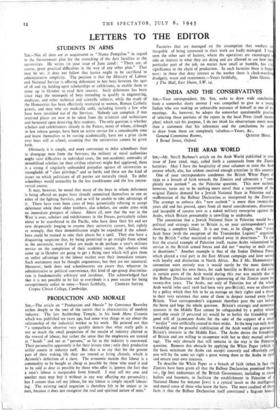PRODUCTION AND MORALE SIR, —The article on " Production and Morale
" by Constance Reaveley strikes deeply to the root of the unrest that is characteristic of modern industry. The late Archbishop Temple, in his book Mens Creasrix which was published ten years ago, had some wise things to say about the relationship of the industrial worker to his work. He pointed out that " a sympathetic observer very quickly detects that what really galls is not so much the small proportion of the results of industry allotted as the reward of labour, but rather the sense that the employees are treated as " hands " and not as " persons," so far as the industry is concerned. Their personality apparently is for their leisure time ; only their productive utility counts in industry tself. But this is to say that for the greater part of their waking life they are treated as living chattels, which is Aristotle's definition of a slave. The economic maxim that labour is a commodity to be bought as cheap as possible by those who need it and to be sold as dear as possible by those who offer it, ignores the fact that a man's labour is inseparable from himself. I may sell my coat and another man may buy it without in any way affecting my personality ; but I cannot thus sell my labour, for my labour is simply myself labour- ing. The existing social organism is therefore felt to be unjust at its root, because it does not recognise the real and spiritual nature of man."
Factories that are managed on the assumption that workers zr: incapable of being interested in their work are badly managed. I hart seen the other sort of factory, where the operatives are encouragdd take an interest in what they are doing and are allowed to see how theu particular part of the job, no matter how small or humble, has vitt! significance in the chain of production. In such factories there is happ: ness: in those that deny interest to the worker there is clock-watching
drudgery, waste and resentment.—Yours faithfully, JOHN GLOAG.
3 The Mall, East Sheen, S.W. 14. •




























 Previous page
Previous page